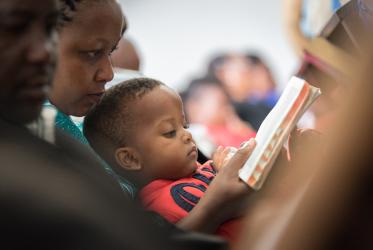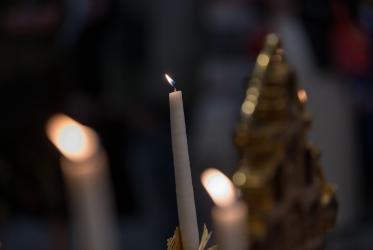In many ways, the World Council of Churches (WCC) pilgrimage of justice and peace hinges on protecting, advocating, and educating people about human rights. In Nigeria, a series of workshops in November promoted human rights across a number of WCC programme areas, including the Churches’ Commitments to Children, preventing gender-based violence, and engaging with the United Nations human rights system.
Jennifer Philpot-Nissen, WCC programme executive for human rights, helped organized the workshops. WCC interviewed her shortly after these workshops were declared a success by participants, instructors, the media, local religious leaders and policymakers.
Q: Why has the WCC organized this workshop in Nigeria? What was the objective?
Philpot-Nissen: The workshops were organized following a request from the Methodist church in Nigeria for support from the WCC in raising awareness and advocating on behalf of victims of violence, particularly women and children.
The project cut across several key priority areas for the WCC, namely the Churches’ Commitments to Children, the work around ending sexual violence against women and girls, and the focus on supporting churches in engaging with the UN human rights system. Nigeria will report to the Human Rights Council's Universal Periodic Review (UPR) in 2018, so this provided a key opportunity to raise these concerns within the UN system and encourage the government of Nigeria to respond with positive measures.
The particular objectives of the workshops were to give civil society - particularly children - a chance to have their voices heard and to shape the contents of a combined WCC and Christian Council of Nigeria report to be submitted to the UN.
Q: Tell us a little more about the UPR - the Universal Periodic Review - and how faith-based organizations are able to support countries in this process. What is the role of the WCC?
Philpot-Nissen: The UPR is a mechanism of the UN Human Rights Council through which every single UN member state has its human rights situation reviewed by its peers - meaning other governments - every four to five years. Recommendations are issued, and four to five years later, the state under review must give an account for the actions it has taken.
Civil society is an important stakeholder in this process in that a report compiling inputs from non-governmental organizations, churches, academics and other groups forms one of three main documents which make up the review and shape the discussion. The WCC supports churches around the world that wish to engage in this process, alerting them to the upcoming reviews in their countries, giving technical advice about the process, and supporting their engagement both in-country and in Geneva. The goals are to ensure that the voices of those most affected by human rights concerns are heard, and that people - including children - are empowered to speak out, leading to tangible changes in their lives.
Q: Please tell us more about the content of the workshops. Who participated? What were the positive results?
Philpot-Nissen: Five workshops were held - two in Benue state, two in Jos and one in Ibadan. Two further workshops will be held in December in Enugu, in the east of the country, facilitated by the local team that supported the WCC visit and were trained in how to engage with the UPR. In Benue and Jos, one day in each location was dedicated to adults, and one day for children. In Ibadan, the two groups were combined into a one-day workshop.
In Benue, the participants were members of the congregation of the local Methodist church, and in Jos and Ibadan, they came from several different schools in the areas and included people with disabilities. The workshops covered topics such as an introduction to child rights, freedom of religion and belief, sexual violence and rights of people with disabilities, however they were also designed to allow participants to raise their own concerns.
Lack of access to education, the security situation and inadequate infrastructure and poverty were key themes throughout the workshops. At the end of each workshop, participants drafted a set of key concerns and recommendations they wanted reflected in the final report which will be sent to the Human Rights Council.
Q: What is your strongest impression from this mission?
Philpot-Nissen: The warm welcome and overwhelming level of hospitality and care we were given throughout the 12-day visit will remain a treasured memory of my time in Nigeria. It is a country of strong contrasts - a deep belief in God and his love for us, a kindness and compassion for those around, coupled with vast inequalities of wealth and access to resources, and the division and conflict which this brings.






